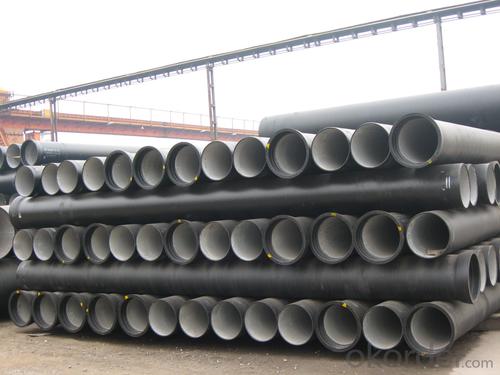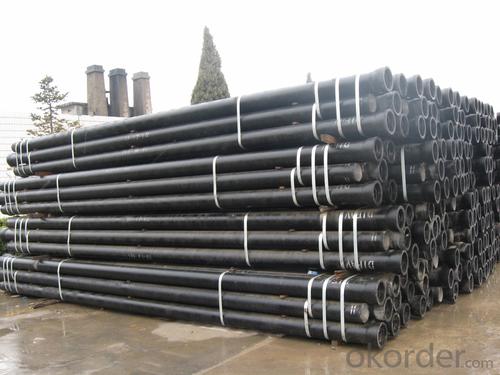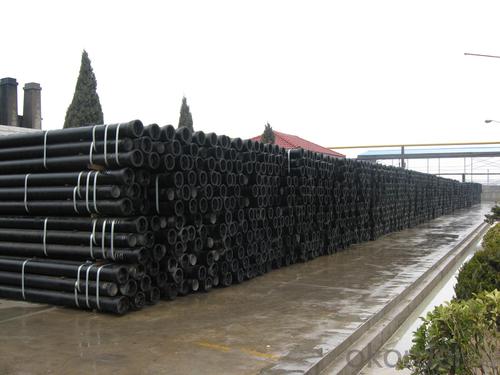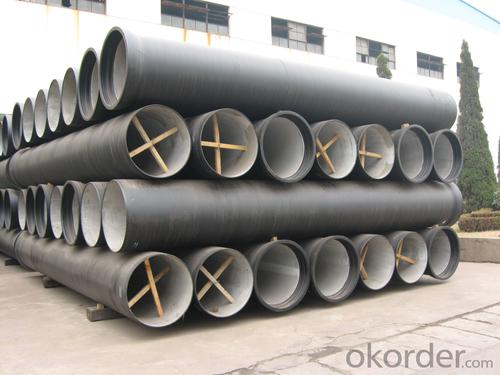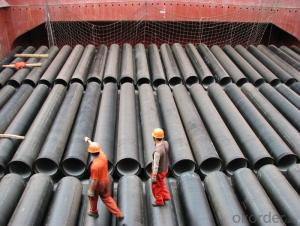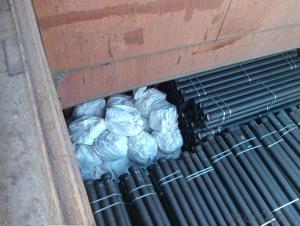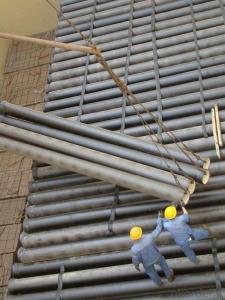DUCTILE IRON PIPE DN150 K9/C/K8
- Loading Port:
- China Main Port
- Payment Terms:
- TT or LC
- Min Order Qty:
- 23 m.t.
- Supply Capability:
- -
OKorder Service Pledge
OKorder Financial Service
You Might Also Like
Specification:
1) The standard of pipe: ISO2531:1998, K9
2) Effective length: 6m
3) Inner cement line: Portland cement line as per ISO4179
4) Zinc coating: at least 130g/m2 as per ISO8179
5) Bitumen painting: at least 70um as per ISO8179
6) With 100% quantity of NBR ring, or SBR ring, or EPDM ring as per ISO4633
7) DN80mm-800mm
8) High strength, lighter than grey iron, good corrosion resistance, no furring, small flow resistance, easy fixing, long life tome about 100 yeas
9) Produced by Hangzhou chunfeng machine
10) Composition:
Chemical composition | ||||||
Chemical composition | Ductile Cast Iron Pipe (%) | Grey iron pipe (%) | Steel pipe (%) | |||
C | 3.5-4.0 | 3.2-3.8 | 0.1-0.2 | |||
Si | 1.9-2.6 | 1.4-2.2 | 0.15-0.4 | |||
Mn | 0.15-0.45 | 0.4-0.6 | 0.3-0.6 | |||
P | ≤0.06 | ≤0.3 | 0.02-0.03 | |||
S | ≤0.02 | ≤0.1 | 0.02-0.03 | |||
Mg | 0.03-0.06 | |||||
11) Feature:
Mechanical properties | ||||||
Ductile Cast Iron Pipe | Grey Iron Pipe | Steel Pipe | ||||
Tensile Strength(Mpa) | ≥420 | 150-260 | ≥400 | |||
Yield Strength(Mpa) | ≥300 | No Confirmation | No Confirmation | |||
Bending Strength(Mpa) | ≥590 | 200-360 | ≥400 | |||
Elongation (%) | ≥10 | Neglected | ≥18 | |||
Brinell Hardness(HBS) | ≤230 | ≤230 | About 140 | |||
12) T type mechanical joint
13) Packing: in bulk or container
PACKING: 1) Pipesare bundled together with the steel belt.
2) Wooden pieces are put between the pipes.
- Q: Can ductile iron pipes be used in nuclear power plants?
- Yes, ductile iron pipes can be used in certain applications within nuclear power plants. However, their use is limited to non-safety-related systems where they are not exposed to radioactive environments or high-pressure conditions. Safety-related systems within nuclear power plants typically require materials with higher resistance to radiation and pressure, such as stainless steel or other specialized alloys.
- Q: Ductile iron pipes perennial bubbles in the water will rot it
- Water supply pipe is the first choice, with high cost performance. Compared with the PE pipe, from the installation time, ductile pipe PE pipe installation is simple and rapid, and after the installation of internal and external pressure bearing better tightness and corrosion resistance; from the point of view, ductile pipe sealing better after installation, but also can improve the corrosion resistance through various anti-corrosion methods;
- Q: Ductile iron pipe converter, steel transition DN100 turn 100, what is the specific accessories name? Can you supply photos?
- Strong toughness: the pipe can be stretched to 5 times the original length without fracture, which is suitable for uneven geological conditions without affecting its link performance. In the case of a breach, there is no extension of the mouth due to the breach.
- Q: How are ductile iron pipes protected against internal corrosion?
- To safeguard ductile iron pipes from internal corrosion, a range of preventive measures are implemented. The foremost technique involves the application of a protective coating on the pipe's inner surface. This coating acts as a barrier that separates the pipe from the conveyed fluid, thereby minimizing the risk of direct contact and corrosion. Another commonly employed method is the usage of a cement mortar lining, which fortifies the protective barrier, thereby reducing the possibility of corrosion, even in aggressive environments. Moreover, this lining ensures a smoother surface, enhancing fluid flow by diminishing friction. Apart from coatings and linings, ductile iron pipes are often designed with corrosion-resistant alloys or additives. These alloys, such as zinc or epoxy, are incorporated during the manufacturing process, offering an additional layer of defense against internal corrosion. They function as sacrificial anodes, corroding over time to shield the underlying iron from degradation. Regular maintenance and inspection play a vital role in safeguarding ductile iron pipes against internal corrosion. Monitoring the condition of protective coatings, identifying any signs of degradation or damage, and promptly addressing such issues are imperative to ensure the long-term integrity of the pipes. In summary, a combination of protective coatings, cement mortar linings, corrosion-resistant alloys, and regular maintenance efforts collaboratively safeguard ductile iron pipes against internal corrosion. This approach prolongs their lifespan and guarantees the secure transportation of fluids.
- Q: Can ductile iron pipes be used for irrigation systems?
- Yes, ductile iron pipes can be used for irrigation systems. Ductile iron pipes are commonly used in various applications, including water supply systems and irrigation systems. They are known for their strength, durability, and corrosion resistance, making them suitable for transporting water in irrigation systems.
- Q: How are ductile iron pipes tested for quality assurance?
- Ductile iron pipes undergo various testing procedures to ensure their quality and meet industry standards. These quality assurance tests are conducted on both raw materials and finished products to ensure the durability, strength, and overall reliability of ductile iron pipes. One of the initial tests is the chemical analysis of the raw materials used in manufacturing the pipes. This analysis ensures that the composition of the iron, carbon, and other elements is within the specified range, as different compositions can affect the pipe's strength and corrosion resistance. Next, mechanical tests are performed to evaluate the strength and ductility of the pipes. Tensile tests are conducted to determine the ultimate tensile strength, yield strength, and elongation properties of the pipe. This helps in assessing the pipe's ability to withstand external pressure or bending forces. Additionally, impact tests are performed to evaluate the pipe's resistance to sudden loading or impact. This test measures the energy absorbed by the pipe when subjected to a high impact force, ensuring that it can withstand potential accidental impacts during installation or operation. Another critical test is the hydrostatic pressure test, which checks the pipes' ability to withstand internal pressure. In this test, the pipes are filled with water and subjected to a specified pressure for a specific duration. This ensures that the pipes can withstand the expected operating pressure without any leakage or failure. Furthermore, dimensional and visual inspections are conducted to ensure that the pipes meet the required specifications. These inspections include checking the pipe's outer diameter, length, wall thickness, and overall appearance for any defects, such as cracks, voids, or irregularities. Lastly, corrosion resistance tests are performed to assess the pipe's ability to resist corrosion when exposed to different environments or fluids. This helps in determining the expected lifespan of the pipes and their suitability for various applications. Overall, these quality assurance tests play a crucial role in ensuring that ductile iron pipes meet the required standards and provide reliable and long-lasting performance in various infrastructure projects.
- Q: Are there any special coatings or linings available for ductile iron pipe?
- Yes, there are special coatings and linings available for ductile iron pipe. These coatings and linings are applied to the internal and/or external surfaces of the pipe to provide protection against corrosion and extend the lifespan of the pipe. Some common coatings and linings used for ductile iron pipe include cement mortar lining, polyethylene encasement, epoxy coating, and polyurethane lining. These coatings and linings are designed to prevent the pipe from corroding when in contact with various substances such as water, chemicals, and soil. The specific coating or lining used depends on the application and the environment in which the pipe will be installed.
- Q: Can ductile iron pipes be used for underground sewage systems?
- Yes, ductile iron pipes can be used for underground sewage systems. Ductile iron is a strong and durable material that is resistant to corrosion and can handle the high pressure and constant flow of sewage. Additionally, ductile iron pipes have a long lifespan and require minimal maintenance, making them suitable for underground sewage systems.
- Q: Method for cutting large diameter ductile iron pipe
- When the oxygen and acetylene volume ratio is greater than 1.2, is formed. As more oxygen, burning, the flame length is shortened obviously, cone tapered inner flame almost disappeared, and a strong desire. Making due to oxygen, the oxidation of metal, so are not widely used, only used for welding of brass, to prevent evaporation of zinc.
- Q: How are ductile iron pipes connected together?
- Ductile iron pipes are typically connected together using a jointing method called push-on joint. This involves lubricating the spigot end of one pipe and inserting it into the bell end of another pipe. The two pipes are then pushed together until the spigot end reaches the center of the bell end, creating a tight and secure connection.
Send your message to us
DUCTILE IRON PIPE DN150 K9/C/K8
- Loading Port:
- China Main Port
- Payment Terms:
- TT or LC
- Min Order Qty:
- 23 m.t.
- Supply Capability:
- -
OKorder Service Pledge
OKorder Financial Service
Similar products
Hot products
Hot Searches
Related keywords




